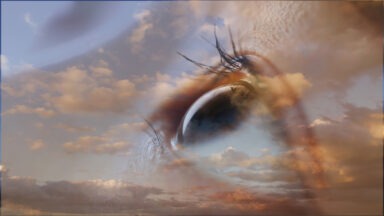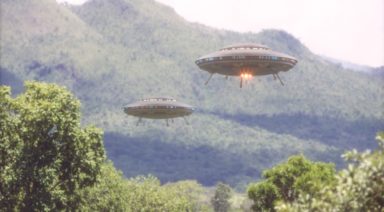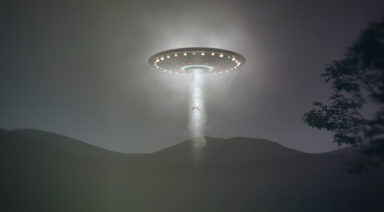What 2021s UFO News Taught Us About Gov. Disclosure

2021 has been called the year of the UFO, with UFO news seemingly breaking every month, and it hasn’t stopped yet.
The Pentagon recently announced the formation of the “Airborne Object Identification and Management Synchronization Group” to replace the UAP Task Force, on the heels of the much-anticipated UAP report from the US government that came earlier the year.
To break down the events of the past year and provide context, Nick Pope, who worked for the UK’s Ministry of Defence on the UFO phenomenon, weighed in.
“2021 has been a huge year for the UFO topic, the big story, of course, was the preliminary assessment of unidentified aerial phenomena produced by the Office of Director of National Intelligence,” Pope said.
“It said that a lot of these sightings could not be explained even after a rigorous investigation by the military. It said that some of these cases appeared to display the hallmarks of advanced technology examples. Two examples of that are signature management and a degree of radiofrequency energy. So it was big and of course, work is continuing, there will be all sorts of follow-up.”
This year saw a number of senior government officials, some former, some in office, speak out on the issue of UFOs and potential extraterrestrial life.
“2021 absolutely saw an uptick in the number of senior people speaking out on this,” Pope said. “We had former Director of National Intelligence John Ratcliffe, we had former CIA Director James Woolsey, DNI Avril Haines, NASA Administrator Bill Nelson, Jeff Bezos spoke, and a number of others. Again, it’s unprecedented I think, when we’ve had people like Luis Elizondo of course, speaking out on this for some time now. What we’re seeing now is a validation of a lot of that when the senior folks pile in and say ‘Yes, there is something to all this, and who am I to rule out the extraterrestrial hypothesis?’”
We’ve recently reported on Senator Kirsten Gillibrand’s amendment to the national defense authorization act which included multiple groundbreaking UFO-related topics. That amendment was taken up in the National Defense Authorization Act and in an increasingly rare moment of bipartisanship, featured several republican co-sponsors and a call for open reporting.
“Senator Gillibrand and Senator Marco Rubio, who subsequently endorsed her amendment and put his name on it too, have said ‘Yes, whatever Congress gets,’ which will be classified, ‘there must be at least an annual report for the public and the media,’ which will be unclassified of course, as with the June 2021 preliminary assessment. But at least people will get something, that’s probably more than the Pentagon wanted to do,” Pope said.
Pope started studying the UFO phenomenon for the UK’s ministry in 1991. We asked if he’s seen a societal shift when it comes to UFO phenomena over the past 30 years.
“A critical mass has built upon this issue. Now certainly, I don’t know how it plays into the wider public, but in the circles in which I move, there’s an absolute acceptance now that this is something that was overlooked or stigmatized for too long,” Pope said. “The realization now I think, from within the government, from within Congress, that this is a safety of flight issue, a defense issue, and a potential national security challenge. The key takeaway is that folks are going to be taking this more seriously than they have before.”
How can we sum up 2021 and what can we look forward to in 2022 and beyond?
“As I look back on 2021 I think it’s a year of very solid progress. 2022 we’ll doubtless see a ramping up of the official research and investigation program. I mean we’ve got a lot of fabulous resources and capabilities that sit within the US. The problem is they’re no good if you don’t use them. What has been lacking is the will to use these resources, these capabilities, this expertise; to use all that to solve the UFO mystery. There’s a lot going on, a lot happened in 2021, but a lot to look forward to in 2022,” Pope said.
Constitutional Attorney Explains History of Government UFO Secrecy

Constitutional attorney Daniel Sheehan is one of the more credible and informed sources on the history of UFO non-disclosure. Having been involved with a number of cases tangentially related to the government’s UFO secrecy, he offers an insider’s view and sets the record straight about how private corporations have controlled government policy and why they have waged a disinformation campaign to protect their interests and consolidate power.
Over the past few years, the Pentagon has pivoted to admitting that UFOs (now referred to as Unidentified Aerial Phenomena or UAPs) are a real phenomenon. However, the question remains as to whether the public is being told the truth or whether a deeper cover-up is taking place.
There are some in the world of ufology who may wonder what Sheehan’s motives are, and which side of the fence he’s on, regarding his decision to take on former counterintelligence officer Luis Elizondo, as a client. But before addressing this question, Sheehan carefully recounts the strange history leading up to our contemporary period of ostensible disclosure.
After the Civil War, a group of roughly 30 families sought to dominate the instrumentalities of the United States by consolidating power into corporate structures that would influence global, geopolitical mechanisms, according to Sheehan. This group laid the foundation for a power structure that has maintained control for nearly two centuries, propping up fascist regimes in the aftermath of both World Wars, including the Third Reich.
By the time of the Roswell Incident of 1947, and in the post-WWII climate, the fledgling power brokers of the late-1800s were already well in control of the military-industrial complex.
When alien technology from the crash was studied, these groups found a way to monopolize it “so they could use it to the advantage of the United States and the western allies in the Cold War,” Sheehan said.
This strategy was operational up until 1991 when the Soviet Union dissolved. At this point, the United States, as well as all of Western civilization, began figuring out how to reorient itself after this decades-long confrontation.




































